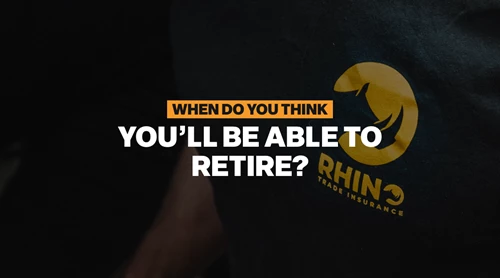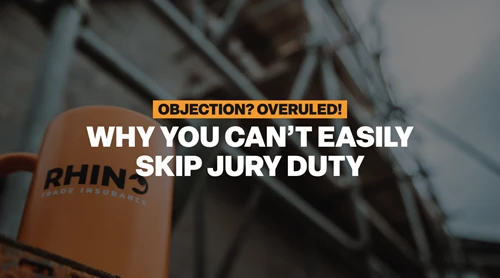We may sell insurance but believe it or not, we’re human too.
We know insurance-speak can be confusing, so we’re here to change that. We want to make selecting the right insurance policy as simple and hassle-free as possible, so here's a handy guide to the insurance jargon you’re most likely to come across.
Quote
The first stage of taking out any form of insurance is the quote. This is your personalised estimation of which policies you might need – and how much they will cost you.
The reason there isn’t a one-size-fits-all approach to insurance quotes is because every person and every business is different and there are many variables which affect the cover you’ll need and the premiums you’ll pay.
Things like number of employees, annual turnover, nature of business and company structure all affect your quote amount.
Policy
The Policy is the document issued by your insurance provider which details the terms of your contract with them, and the type of cover they will provide to you.
The Policy is an important document – along with the Schedule of Insurance it’s your legal evidence that you're insured. Luckily, you’ll receive a copy via email so it can’t blow away.
Schedule of insurance
Your Policy will also include a Schedule of Insurance, which will list the details of your policy.
This will include the details you’ve given (like your name and address), the dates your cover will apply, your personal premium amount and the payment schedule, which is when your payments will be due.
Premium
The premium is the regular amount you’ll pay the insurance company for your policy. It’s basically how much the policy is going to cost you to hold, not counting any excess you’ll pay for making a claim.
Insurance premiums vary from person to person. This is because things like where you live, your vehicle, your line of work and your claims history all influence your premium amount – and no two people are exactly the same.
CLAIM
This is an easy one – the claim is the request you make to your insurance company for reimbursement against a loss you have incurred.
Claims should be made as soon as possible to avoid any issues with your payout. Sometimes, you’ll need additional information like a police crime report number if you’re claiming for things that have been stolen.
You can usually make your claim by phone, email or post. You’ll need your policy number handy when making your claim.
Excess
The excess is to the amount of money you’ll pay to the insurance company if your insurance claim is successful.
Why do you have to pay an excess, you ask? It goes towards the cost of your claim and helps keep your premiums down.
Your excess will be lower if you’re making a smaller claim. For a larger claim (for example, van theft with full kit inside) the excess will be higher. Don’t worry though, it will be small change compared to what it’d cost you to replace everything without insurance.
‘Excess’ is sometimes written as a 'deductible' in insurance policies, just to be confusing. It means the same thing.
Exclusions
Exclusions are eventualities that aren’t covered under your insurance policy.
Some circumstances, or types of loss, are generally excluded from insurance policies.
For example, personal accident cover won’t cover anything that happened while under the influence of drugs or alcohol – that’s considered an exclusion.
add-on policy
An add-on insurance policy is extra cover you can take out that isn’t covered in the main policy you’ve taken out, but is relevant to you or your business.
Add-on policies help expand your cover to protect you against further eventualities which could leave you out of pocket.
For example, if an employer has any staff, Employers Liability Insurance would be a useful add-on policy for a tradesman taking out their Public Liability Insurance.
You pay an additional premium for add-on policies.
INCOME PROTECTION
Self-employed people don’t have the luxury of sick pay. This is where income protection insurance comes in.
This type of insurance will pay out if something happens (like sickness or injury) that means you’re unable to work and as a result, unable to make a living.
If this happens, the policy will pay a monthly benefit payment based on the option you chose when taking out your policy. You can use this payment to pay the mortgage, bills and other essential expenses while you’re recovering.
Personal Accident
People who work in the trades have a higher-than-average chance of injury or accident than those with office-only jobs.
Not nice to think about, but it’s true.
Personal Accident Insurance is designed to help with the financial burden if you have an accident and need extra financial support while you’re unable to work.
Personal Accident Insurance is different to Income Protection Insurance, as it pays out a lump sum rather than a monthly benefit. However, they are similar in that they both support self-employed people should something unfortunate happen.
Personal Accident Insurance is sometimes bought as a standalone, but more often it is combined with Income Protection cover as an add-on.
Indemnity
Indemnity in insurance is when one party (your insurance company) is responsible for compensating another party (you) for losses a third party (your client) might incur.
Professional Indemnity (PI) Insurance protects you from financial loss if one of your clients is negatively affected as a result of your advice, designs or expertise.
Most tradesmen need this – in fact, many contractors and clients won’t work with you unless it’s in place.
Your personal indemnity amount is the limit of what they’ll pay out to protect you should a client bring a claim against you.
Limit
The limit is the maximum amount your insurance company is liable to pay you, even at the maximum level of your policy. So, you can think of the limit as the maximum amount you could receive if you make a claim.
The limit you choose is up to you up to the maximum value the insurer offers. A higher limit means higher premiums.
Territorial Limit
Some insurance coverage is only valid if you operate within a specific geographic region. This is usually Great Britain, Northern Ireland, the Channel Islands and the Isle of Man, but you should check your policy wording to make 100% sure.
For most people, this isn’t a problem as we tend to live and work within the same area.
However, if you want to take your tools abroad, you have to know that they won’t be covered under your policy while you’re out of your territorial limit.
Employers’ Liability
If you work completely solo, this one won’t apply to you. But if you hire staff in any capacity – including subcontractors and temporary workers – you need to know about Employer’s Liability Insurance.
Employer's Liability Insurance protects you if one of your employees submits a claim against you for an injury they have received while directly working for you. It also covers accidental death.
If you’re found liable, this type of insurance will cover the costs you might incur as a result of their claim. This will be up to a certain indemnity – an amount chosen by you when you take out the policy.
So, with Employer’s Liability Insurance, if a subcontractor falls while on-site with you and can’t work for a week, you won’t be personally on the hook for their medical bills and loss of income. Your insurer will take care of that.
Public Liability
This is a type of insurance that protects you from legal fees and compensation claims that could be made by members of the public if they are harmed as a result of your business.
For example, if a member of the public has their property damaged, gets injured or even dies during the course of your business activities, there may be good grounds for them to make a claim against you.
With Public Liability Insurance in place, you won’t take the full financial hit should this happen.
It’s often a contractual requirement for tradesmen to have Public Liability Insurance. If not, it’s highly recommended. Accidents do happen and nobody wants to take a risk on losing everything to a compensation claim.
Bona fide subcontractors
A bona fide subcontractor is a person who you can hire to carry out a specific job on site (e.g. plumber or electrician).
To be classed as a bona fide subcontractor, they must work independently, have their own Public Liability Insurance, and be legally responsible for their own work. They might provide their own materials and tools, too.
And ‘bona fide’? It’s fancy Latin but it just means ‘genuine’ or ‘in good faith’.
Labour-only subcontractor
Labour-only subcontractors are different to bona fide subcontractors as they don’t work independently.
Labour-only subcontractors are under your professional direction, (although they're not necessarily employees). They use the tools and materials supplied by your company and are required to comply with your health and safety regulations.
WITHDRAWAL PERIOD
In insurance, the withdrawal period is the time you get after you’ve taken out or renewed a policy to change your mind and cancel it.
You don’t need a reason for this – so long as it’s within the period specified, you’ll get a refund of any premium paid so far. That is, assuming you’ve not made a claim already.
Sometimes it’s referred to as the ‘cooling off period’.
Usually, the withdrawal period is 14 days. It will be written in your Policy document, so be sure to check.
SICK of insurance Jargon?
So are we. Insurance might be our day job, but just like you, we prefer to speak in plain English.
At Rhino Trade Insurance we make things as straightforward as possible, so you can make a quick and informed decision about your cover.
We know that being clear about the specifics of your tradesman insurance policies will help save us both time in the long run. So, we don’t hide behind legal babble.
However, if you still have questions, our friendly UK-based support team are available six days per week. So if you need any help or support when browsing our insurance, call us on 0116 243 7904 or contact our customer services team.




